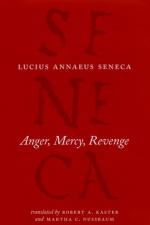|
This section contains 3,166 words (approx. 11 pages at 300 words per page) |

|
SOURCE: "Art and Ethics in the Drama: Senecan 'Pseudo-tragedy' Reconsidered," in Senecan Tragedy, Adolf M. Hakkert, 1988, pp. 43-65.
Motto and Clark study the literary merits of the seven plays that can be ascribed to Seneca with certainty. They postulate that an over-emphasis on the importance of his philosophical writings to his drama impedes appreciation and understanding of the plays.
Perhaps the major stumbling-block to an understanding and appreciation of Seneca's theater is the fact that Seneca was a philosopher. For many, that fact virtually constitutes an insurmountable obstacle and blinding light. As a result, too many critics argue that Seneca wrote his tragedies to expound his philosophic doctrines. They postulate—what has ever been in some quarters suspected—that the plays by the Stoic Philosopher are fundamentally Stoical. One critic [Berthe Marti, "Seneca's Tragedies: A New Interpretation," Transactions and Proceedings of the American Philological Association 76 (1945)] has gone so...
|
This section contains 3,166 words (approx. 11 pages at 300 words per page) |

|


